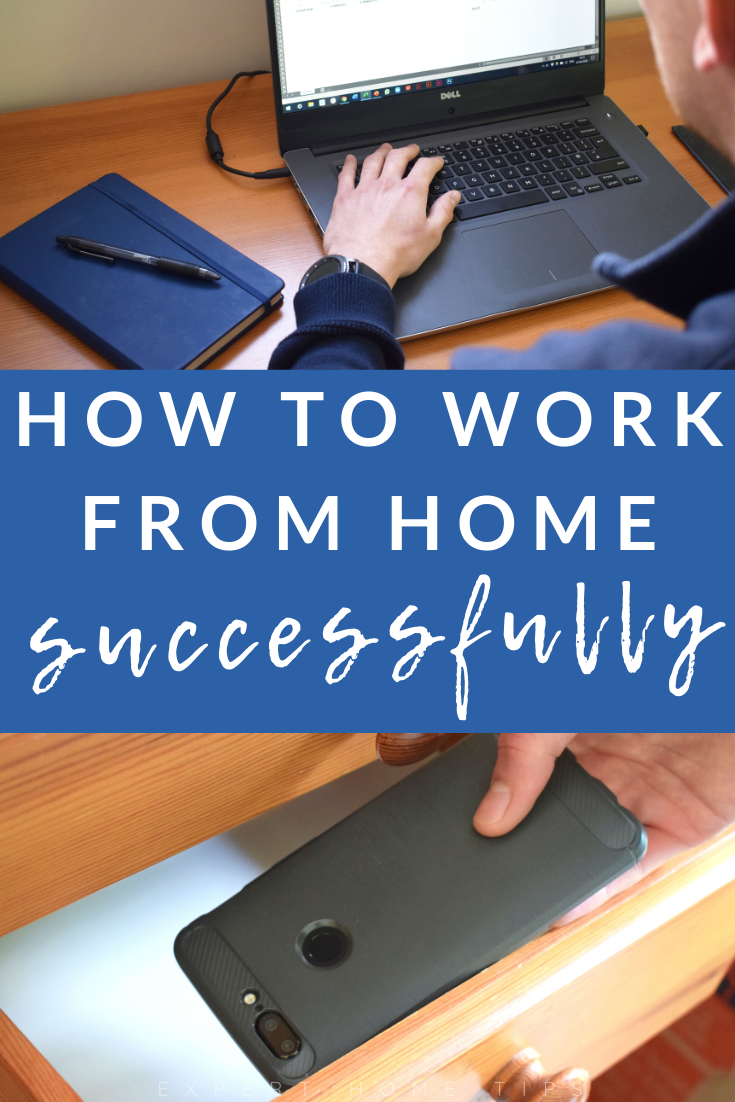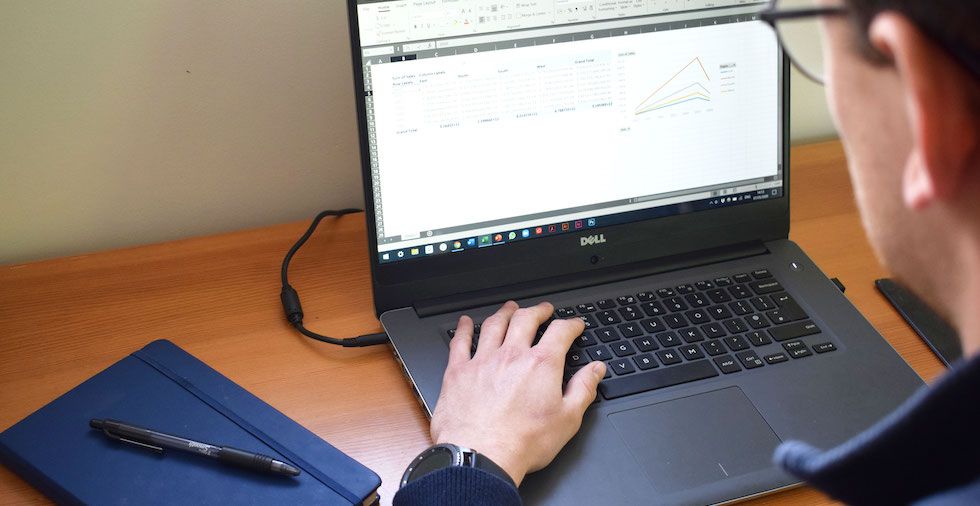You’ve waved the morning commute goodbye and swapped your co-workers for the cat. Working from your living room may sound like a dream-come-true for some, but how can you stay on track each day?
In this guide, we’ll take a look at how to work from home successfully and offer easy tips to get you started.
How To Work From Home Successfully
1. Create a dedicated workspace

You’re sitting on the sofa, laptop resting on your knees, with the TV blaring in the background. What’s wrong with this picture? We’ll save you some time… everything. If you’re wondering how to work from home, one of the most important things you need to do is create a dedicated workspace.
The working area you're able to make will depend largely on the type of house or flat that you live in right now. If you’re lucky enough to have a spare room, you could turn it into a study. Of course, many of us are not that fortunate, and so have to look for other options. If all you've got is a tiny living room, you should still try to dedicate a corner to work, for instance.
Whatever area you choose, the rules are the same. Make the space conducive to work. You need ample desk or table space, sufficient lighting, and minimal clutter. Why not check out these office organisation ideas to get started?
2. Dress for work every morning
Spoiler: What you wear affects how you work. Information published in the Journal of Experimental Social Psychology suggests that professionals experience ‘enclothed cognition’ when wearing certain threads. For example, as part of the research, participants who wore white lab coats did better when it came to tests that required attention.
While it may be tempting to lounge around in your fluffy pyjamas all day long, doing so could be hindering your productivity. When we talk about how to work from home successfully, we should never overlook the power of our clothing. Each morning, get up and get dressed as you would if you were heading to the office. It'll make a big difference.
3. Track your working hours
You start the working day, sit down at your computer, and within minutes you find yourself aimlessly scrolling through Facebook or the news. Oops, you did it again. If you can’t help getting distracted, tracking your working hours could help. There are loads of handy tools online including Toggl, Harvest, and Everhour you can try. With all of the above, you simply press a start button when you work and pause when you have a break.
While you may not need to track your hours for work, this trick is a great way of staying focussed. Knowing that you’re being timed means you’re more likely to concentrate on the task at hand. You are conscious of when you take breaks and how long for. For example, you could set yourself a challenge to work for an hour and have a five-minute break.
If you're feeling like your whole day is spent on work, why not wake up early and try to squeeze in one of these seriously productive activities?
4. Dealing with distractions

If there’s one thing that’s certain to ruin your workday, it’s distractions. Research shows that a three-second interruption can double the number of mistakes you make on your work. Keeping distractions to a minimum is always a smart move!
Some people can happily work away with the radio on in the background, while others find it too much. Consider what takes your attention and try removing it. If you find that you’re often looking at your smartphone when you’re working, try leaving it in another room. If you need a helping hand with cutting out the tech, start your simple digital detox today.
For parents, it’s a whole different ball game. When it comes to working from home when you have a toddler or children, you may need to strategise differently. Naturally, looking after your little ones will distract you from work. That’s to be expected. If you have a partner who has a flexible schedule, you might want to try splitting child care duties. That means one of you watching the kids while the other one works.
Of course, that’s not always possible. You might be a single parent or your partner may have strict working hours. In that case, it’s about getting your children to engage with something while you work. You could set them tasks or creativity challenges to do while you’re busy. If your kids are of school age, you could set them activities from BBC Bitesize. Keeping them distracted won’t be easy but trying these small tricks could help.
We've got some excellent resources for busy parents, including garden activities for kids and some super fun ways to keep the kids busy.
5. Take an exercise break
Let’s face it, sitting in the same position for hours on end is hardly stimulating. It’s tough. You might feel like you’re stewing, which is hardly going to help you stay on track. One trick you might want to try is taking a short exercise break. Research from the Journal of Occupational and Environmental Medicine suggests that spending part of your work-time exercising can actually make you more productive.
With that in mind, the next time you’re feeling sluggish, take a 10-20 minute break and do some exercise. There’s no doubt that the activities you do at home will be limited. However, there are loads of useful home workouts on YouTube that you can watch. You may also want to use some home workout gear, such as a kettlebell or skipping rope.
6. Plan your daily schedule

There’s nothing worse than waking up and looking at a blank page in your diary. When it comes to working from home successfully, one of the top tips is to schedule well. In some situations, you may have daily tasks that your manager sets you ahead of time. However, if you tend to work more independently, you need to take charge of things.
Scheduling well can help you boost your productivity. How you do it depends on your personal work style. If you want to go old school, you can keep a diary and write down your daily tasks in it. Alternatively, you may want to use the calendar on your laptop or phone to do the same job. If you’re working as part of a team, using programs such as Asana or Trello will help you share your schedule and work collaboratively.
7. Have regular video meetings
Working with a team? While Zoom meetings may be the bane of your existence right now, they could be having a positive impact on your work style. Research from the Journal of Organizational Behavior suggests that teams who meet regularly to debrief are better at problem-solving than those who do not. If you’re struggling to keep on track with certain projects, dedicating regular time-slots to these meetings is the best way forward.
TOP TIP: Have lots of short meetings rather than infrequent long meetings! Why not schedule ten minutes each morning with your team or manager?
8. Switch on and off

Working and living in the same space is a challenge. It’s hard to draw a line between your work and home life. When these two areas start to blur, it can be a recipe for disaster. The solution is to make sure you switch on and off from work. Be clear about what your working hours are and stick to them. When the end of the day comes, close your laptop and don’t open it again until the morning. Research suggests that the expectation that you should check emails out of work hours can harm your health. Avoid it at all costs!
Q&As
What are the disadvantages of working from home?
While working from home can be a nice change, the truth is that there are many disadvantages to it. Being physically far away from your co-workers will make collaborations more tricky. For that reason, you’ll need to use video calls and online programs to try to bridge the gap as best you can.
You may also find that you’re more easily distracted when you’re at home. That in itself can be hard. That’s why dedicating a specific area to work is a must. Ensure that you avoid unnecessary distractions at all costs and try to focus on the task at hand.
Another challenge of working from home is switching on and off. Make sure that you set boundaries and avoid checking emails outside of work hours.
Why is working from home better?
On the other hand, there are plenty of reasons why working from home may be better for your general well-being. Skipping the commute means that you get more free time. You can also avoid any tricky office politics and spend more time focusing on your work.
Is working from home more productive?
Yes! Research from Airtasker found that in-office workers reported an average of 37 minutes ‘idle time’ per day, while remote workers only reported 27 minutes. The takeaway is that remote workers tend to spend more time focussing on their projects. Interesting!
What are you top tips for working at home? Tell us in the comments below!


I'm adjusting to working from home and would encourage people to stick to "normal" working hours, or as close as they can to them. Eat as you would at work at the same times. Take breaks. Even if its just to move to put the kettle on or look out of a window for a few minutes.
Keeping to regular hours is very important - thanks for sharing!
I use AntiRSI which reminds me to take a break every 40 minutes of so. Quite a useful tool
That sounds perfect!